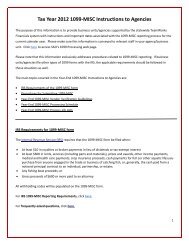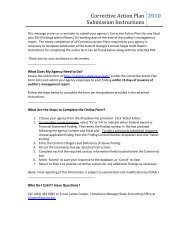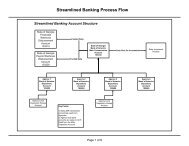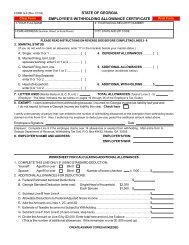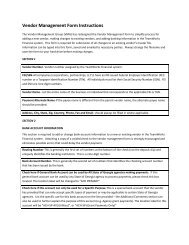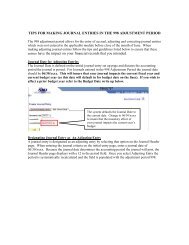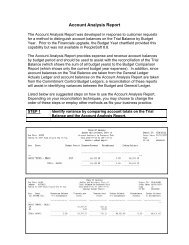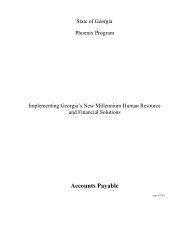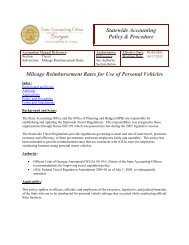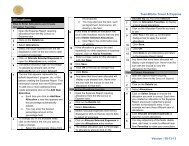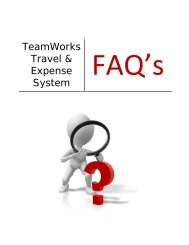Single Audit Report Fiscal Year Ended June 30, 2012 - State ...
Single Audit Report Fiscal Year Ended June 30, 2012 - State ...
Single Audit Report Fiscal Year Ended June 30, 2012 - State ...
Create successful ePaper yourself
Turn your PDF publications into a flip-book with our unique Google optimized e-Paper software.
<strong>State</strong> of GeorgiaNotes to the Schedule of Expenditures of Federal AwardsFor the <strong>Fiscal</strong> <strong>Year</strong> <strong>Ended</strong> <strong>June</strong> <strong>30</strong>, <strong>2012</strong>PURPOSE OF THE SCHEDULEOffice of Management and Budget (OMB) Circular A-133, <strong>Audit</strong>s of <strong>State</strong>s, Local Governments, and Non-ProfitOrganizations, requires a Schedule of Expenditures of Federal Awards reflecting total expenditures for each Federalfinancial assistance program as identified in the Catalog of Federal Domestic Assistance (CFDA).SIGNIFICANT ACCOUNTING POLICIES<strong>Report</strong>ing Entity - The accompanying schedule includes all Federal financial assistance programs administered by the <strong>State</strong>of Georgia for the fiscal year ended <strong>June</strong> <strong>30</strong>, <strong>2012</strong>. Refer to Appendix "A" for a comprehensive listing of organizationalunits comprising the financial reporting entity.Basis of Presentation - The accompanying Schedule of Expenditures of Federal Awards is presented in accordance withOMB Circular A-133.A. Federal Financial Assistance - Pursuant to the <strong>Single</strong> <strong>Audit</strong> Act Amendments of 1996 and OMB Circular A-133,Federal financial assistance is defined as assistance that non-Federal entities receive or administer in the form ofgrants, loans, loan guarantees, property (including donated surplus property), cooperative agreements, interestsubsidies, insurance, food commodities, direct appropriations, and other assistance, but does not include amountsreceived as reimbursements for services rendered to individuals for Medicare and Medicaid.B. Major Programs - The <strong>Single</strong> <strong>Audit</strong> Act Amendments of 1996 and OMB Circular A-133 established a risk-basedapproach for defining Major Federal financial assistance programs. This approach resulted in 27 of 36 Type Aprograms and 14 Type B programs being selected as major programs for the <strong>State</strong> of Georgia. For the fiscal yearended <strong>June</strong> <strong>30</strong>, <strong>2012</strong>, a Type A program is defined as any Federal program which exceeded $33,163,235 inexpenditures/disbursements/issuances.Basis of Accounting - The Schedule of Expenditures of Federal Awards is prepared using the basis of accounting asdescribed in Note 1 of the CAFR.Expenditures and Expenses - When a state organization receives Federal monies and redistributes such monies to anotherstate organization, (i.e. pass-through funds from the primary recipient to a subrecipient), the Federal assistance is recorded inboth the primary recipient's and the subrecipient's accounts. This method of reporting expenditures/expenses results in anoverstatement of the aggregate level of Federal expenditures/expenses. Therefore, net Federal expenditures/expenses arereported in the schedule.OTHERThe following Notes provide additional pertinent information regarding Federal financial assistance:(1) Expenditures reported for CFDA NO. 17.225 include Federal, <strong>State</strong> and/or other funds. More specifically, thisCFDA includes Federal expenditures of $1,415,611,293 and <strong>State</strong> expenditures of $909,243,798.(2) During the fiscal year ended <strong>June</strong> <strong>30</strong>, <strong>2012</strong>, the Department of Public Health (DPH) received $50,254,678 incash rebates from infant formula manufacturers on sale of formula to participants in the Special SupplementalFood Program for Women, Infants, and Children (WIC) (CFDA NO. 10.557). Rebate contracts with infantformula manufacturers are authorized by 7 CFR_246 & PL (Public Law) 108-265 as a cost containmentmeasure. Rebates represent a reduction of expenditures previously incurred for WIC benefit costs. The rebatecontract allowed DPH to serve approximately 59,384 additional persons per month during fiscal year <strong>2012</strong>.245



